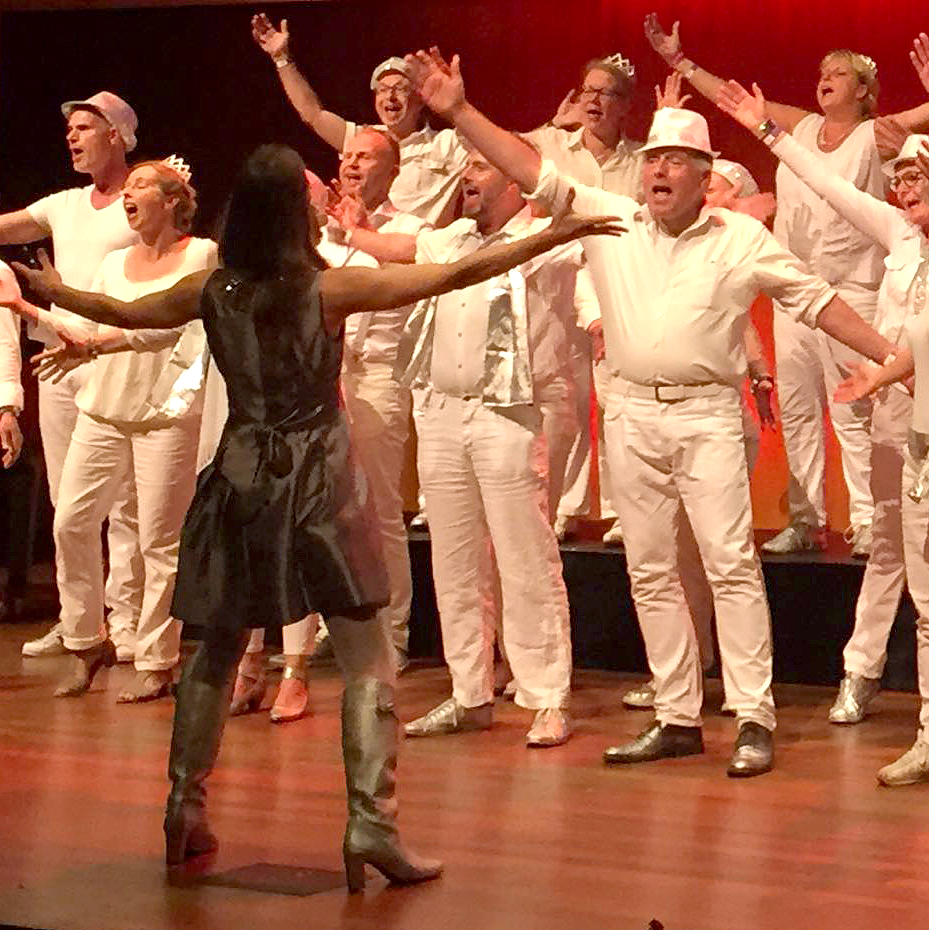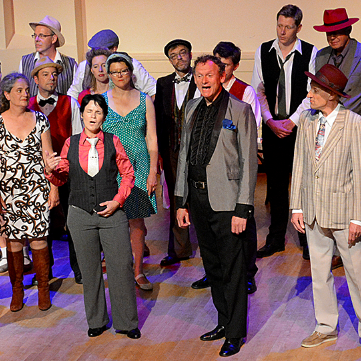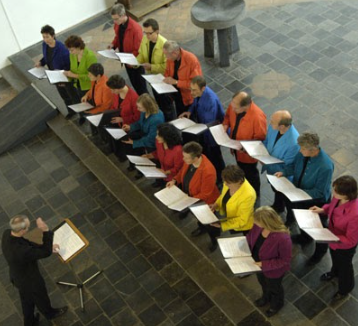About Us
Our history
CANTUS OBLIQUUS – ‘contrary singing’. Singing pleasure since 1986!

Cantus today
Cantus Obliquus is a special choir. It is the oldest mixed gay choir in the Netherlands. The unruly choir that in the early years mainly wanted to sing shocking and socially critical lyrics has changed. Nowadays, the repertoire alternates between classical seriousness and cheerfulness and a bit of melancholy.
From 2022, we will be working continuously on improvement under the inspiring leadership of Nancy Meijer. The repertoire is diverse and ranges from classical, via close harmony and jazz to pop.
Cantus is singing pleasure, but Cantus is also a warm place and an anchor point in the week. Cantus has approximately 40 members.
Performing
Regular performances strengthen the sense of community.
Since 2014 we have participated in Various Voices, the International Gay Choir Festival. In 2014 we were in Dublin Ireland and in May 2018 in Munich Germany. We are now looking forward to Bologna Italy in 2023.
Cantus participates in the annual music festival Nijmegen Geluids! and in the Open Podium voor de stad in Concertgebouw de Vereeniging. The four-yearly festival Tutti the Dutch Pink Choir Festival is also on our program.
Cantus Obliquus gives a major performance every year. In recent years these have included Be Yourself, Kristallnacht with Klezmore and Cantus Summerjazz.
Our 30th anniversary was celebrated with the successful performance of the opera Dido & Aeneas by Henry Purcell. With the cooperation of professional soloists and musicians a special performance was created that we performed twice.
Every year there is a Bonte Avond and the Cantus members surprise each other with music, theatre and song.


Our director Nancy Meijer
As a vocal coach, choir conductor and Voice Liberator, Nancy has a broad orientation when it comes to singing in different music styles in combination with voice use. “The great thing about technique is that you can change the experience for the audience with it. And if you also have more possibilities to use your voice and sing more easily, the picture is complete!”
In addition to Cantus Obliquus, Nancy currently conducts 2 choirs in the region and, as a Voice Liberator, she organizes various activities with which you can use your voice to search for the deeper layers in yourself and the music that is there in you.
Nancy says about Cantus Obliquus: “Cantus Obliquus is not only a choir, but also a close group of friends, almost a kind of family. There is sharing and sympathy with each other and singing is also an outlet. Because the repertoire is very broad, from classical to pop and everything in between, it is a challenge to lead and guide this choir and it is always a surprise for the audience what is performed.” More information about Nancy and her work as a vocal coach, choir conductor and Voice Liberator can be found at: www.nancymeijer.nl
Our pianist Maikel Versantvoort
Since 2024, Maikel has been our regular piano accompanist. Maikel is a passionate pianist

Cantus in the past
In 1986, Cantus started as an occasional choir in honor of a golden priest’s jubilee of Toon van Heusden, the student pastor who meant a lot to the Nijmegen gay movement.
The full name of the choir became Nijmeegs Potten en Flikkers Koor Cantus Obliquus.
In the early years, the repertoire consisted of Dutch poems set to music by the first conductor of Cantus Obliquus Constant Rogmans. After a few years, Jurriaan van Schoffelen was hired as pianist. In 1994, Jurriaan Rogier succeeded him as conductor. The repertoire was further expanded with English classics and sultry German songs from the thirties.
After Rogier and Jurriaan, Theo Menting (2004-2006), Casper van de Vinne (2007-2009) and Christel Geldermans (2009-2021) have also led Cantus.
Since its foundation, Cantus Obliquus has given a free memorial concert on May 4. Each year with a different theme, but Das Lila Lied is often included in the repertoire of this evening.
Das Lila Lied is one of the oldest preserved pink songs. In 1920, Kurt Schwabach wrote the text and dedicated it to Dr. Magnus Hirschfeld, who was one of the leaders of the world’s first gay organization in Berlin.
A year later, ‘Das Lila Lied’ was performed by Marek Weber’s orchestra. In the 1970s, many contacts were made with the Schwulen Bewegung in Berlin. Close friendships were formed and sometimes led to special activities. Berlin archivists found the text of the Lila Lied and it ended up at Cantus. That’s how the Lila Lied started a second life in Nijmegen.

Das Lila Lied
Was will man nur? Ist das Kultur,
daß jeder Mensch verpönt ist,
der klug und gut, jedoch mit Blut
von eig’ner Art durchströmt ist,
daß g’rade die Kategorie
vor dem Gesetz verbannt ist,
die im Gefühl, bei Lust und Spiel
und in der Art verwandt ist?
Und dennoch sind die Meisten stolz,
daß sie von ander’m Holz!
Was will man nur? Ist das Kultur,
daß jeder Mensch verpönt ist,
der klug und gut, jedoch mit Blut
von eig’ner Art durchströmt ist,
daß g’rade die Kategorie
vor dem Gesetz verbannt ist,
die im Gefühl, bei Lust und Spiel
und in der Art verwandt ist?
Und dennoch sind die Meisten stolz,
daß sie von ander’m Holz!
Wozu die Qual, uns die Moral
der Andern aufzudrängen?
Wir, hört geschwind, sind wie wir sind,
selbst wollte man uns hängen.
Wer aber denkt, daß man uns hängt,
den müßte man beweinen,
doch bald, gebt acht,wird über Nacht
auch uns’re Sonne scheinen.
Dann haben wir das gleiche Recht erstritten,
wir leiden nicht mehr, sondern sind gelitten!
